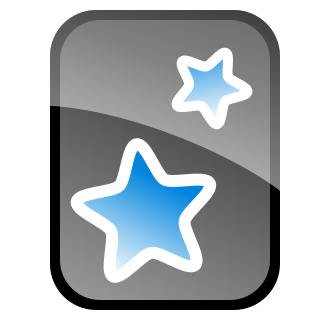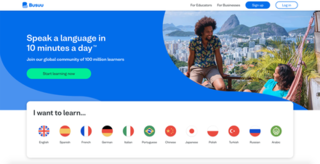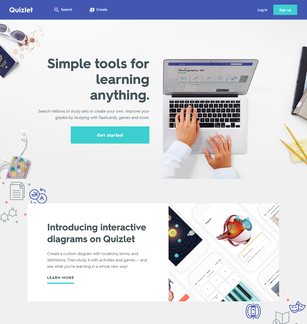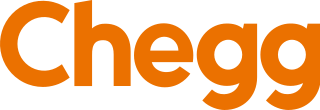
Anki is a free and open-source flashcard program using spaced repetition, a technique from cognitive science for memorization. The name comes from the Japanese word for "memorization".

Busuu is a language learning platform on web, iOS and Android that allows users to interact with native speakers. In 2021, Chegg acquired Busuu for $436 million.
Cramster.com was an educational technology website that provided online homework and textbook help for college and high school students in areas such as math, science, engineering, humanities, business, and writing help. Cramster used a freemium model, allowing students to pay for or earn access to premium services. Founded in 2002 by Aaron Hawkey, Robert Angarita and Kavé Golabi, the company was headquartered in Pasadena, CA. In 2010, the company was acquired by Chegg.

Quizlet is a multi-national American company that provides tools for studying and learning. It was founded by Andrew Sutherland in October 2005 and released to the public in January 2007. Quizlet's primary products include digital flash cards, matching games, practice electronic assessments, and live quizzes. In 2017, 1 in 2 high school students used Quizlet. As of December 2021, Quizlet has over 500 million user-generated flashcard sets and more than 60 million active users.

Chegg, Inc., is an American education technology company based in Santa Clara, California. It provides homework help, digital and physical textbook rentals, textbooks, online tutoring, and other student services.
Course Hero is an American education technology website company based in Redwood City, California which operates an online learning platform for students to access course-specific study resources and online tutors. Subscription or content contribution is required for students to use the platform.
Notehall is an online marketplace, in which college students can buy and sell class notes. Notehall gained recognition after appearing on the ABC reality show Shark Tank in October 2009. It has since been purchased by Chegg, a textbook-rental company, for $3.7M in equity and undisclosed cash. Notehall.com was later integrated into the Chegg Homework Help site.

Koofers was a social media service for college students. It provided academic information sharing. College students hadaccess to the service by creating an account with their e-mail address. Koofers was a private company, founded in 2008 and headquartered in Reston, VA.

Flashnotes is an online marketplace that allows college students to buy and sell course specific notes, study guides, flashcards and other items to help students study and/or earn money throughout their college years.
A mobile application or app is a computer program or software application designed to run on a mobile device such as a phone, tablet, or watch. Mobile applications often stand in contrast to desktop applications which are designed to run on desktop computers, and web applications which run in mobile web browsers rather than directly on the mobile device.
CoboCards is a web application for creation, study and sharing of flashcards. They also provide mobile application for Android and iOS mobile devices, to help study of flashcards on the move.
Chegg Tutors was an online tutoring company that matched students seeking help with online tutors. Students could receive help either on-demand or by scheduling a lesson.
Blackboard Inc. was an American educational technology company with corporate headquarters in Reston, VA. It was known for Blackboard Learn, a learning management system. It merged with Anthology in late 2021, with the future name of the combined company not announced yet.

Boundless was an American company, founded in 2011, which created free and low-cost textbooks and distributed them online. In April 2015, it was acquired by Valore. The combined company is based in Boston, Massachusetts.

RefME was a free citation management tool available on web, iOS and Android. It offered a functionality that allowed users to scan book and journal barcodes with a mobile device and generate citations automatically. It was compatible with other citation management tools such as Mendeley, Zotero, RefWorks, and EndNote and enables exporting in over 7000 citation styles. In May 2015, the company released a Chrome plug-in to allow for direct clipping of web sources, which was followed in August 2015 by a similar iOS extension. RefME was shut down on March 7, 2017, after being acquired by the education company Chegg, Inc.
The commercialization of the Internet encompasses the creation and management of online services principally for financial gain. It typically involves the increasing monetization of network services and consumer products mediated through the varied use of Internet technologies. Common forms of Internet commercialization include e-commerce, electronic money, and advanced marketing techniques including personalized and targeted advertising. The effects of the commercialization of the Internet are controversial, with benefits that simplify daily life and repercussions that challenge personal freedoms, including surveillance capitalism and data tracking. This began with the National Science Foundation funding supercomputing center and then universities being able to develop supercomputer sites for research and academic purposes.
Social media in education is the practice of using social media platforms or technology to enhance the education of students. Social media is defined as "a group of Internet-based applications that build on the ideological and technological foundations of Web 2.0, and that allow the creation and exchange of user-generated content". Social media platforms can be used as a strategy to complete assignments or projects in a technical way. Public service announcements and service learning can be done by students as these activities help enhance a student's learning experience and grant them the ability to learn in an online, interactive way.

The use of mobile phones in schools has become a controversial topic debated by students, parents, teachers and authorities.
Brainscape is a web and mobile education platform that allows students to study adaptive flashcards. The website and mobile application allow students, teachers, and corporate trainers to create electronic flashcards, and to find flashcards created by other users and publishers around the world. Brainscape flashcards and marketing content are also created by expert educators and publishers with whom Brainscape closely partners to create flashcards aligned to strict instructional guidelines. Flashcards are all stored in the cloud and can be shared with groups of other learners.
An online dating application is an online dating service presented through a mobile phone application (app), often taking advantage of a smartphone's GPS location capabilities, always on-hand presence, easy access to digital photo galleries and mobile wallets to enhance the traditional nature of online dating. These apps aim to simplify and speed up the process of sifting through potential dating partners, chatting, flirting, and potentially meeting or becoming romantically involved over traditional online dating services.







